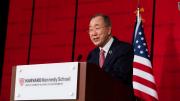Former United Nations Secretary General Ban Ki-moon, M.P.A. ’84, had harsh words for the world’s leaders during an address to Harvard Kennedy School (HKS) graduates on Wednesday afternoon’s Class Day ceremony. Speaking nearly four decades after his own graduation, Ban recalled his experiences at HKS—and with the American president it was named for—and urged the audience toward a “global citizenship” of compassion and justice and defense of freedom. He spoke sharply against the war in Ukraine, now entering its second year after a Russian invasion that “flagrantly violated” international law. Last August, Ban visited the Ukrainian cities of Bucha and Irpin, and “saw firsthand,” he said, “the terrible, unacceptable atrocities committed. It was a crime against humanity….Neutrality is not an option.” The war in Ukraine, he said, is “directly related to the fundamental issue of justice.”
But the bulk of Ban’s remarks were devoted to the rising crisis of climate change and the “dystopian” future it risks. “It is up to your generation to fix what my generation failed to fix,” he said.
Noting the recent upswing in unprecedented floods, wildfires, droughts, and crop failures, he told graduates, “I regret that we are passing on this impending threat to you…. But the fact of the matter is that today’s world leaders have thus far failed miserably by putting selfish national interests ahead of urgent, global needs.” Instead of taking action to curb CO2 emissions and limit rising temperatures, he said, “They have decided to play a dangerous game of chicken.” The have “failed to see the big picture: that the world will sink or swim together.”
Ban led the United Nations from 2007 to 2016, a period of multilateral climate action and a rising sense of urgency, culminating in 2015 in the Paris Climate Agreement. More than 100 countries, including the United States, pledged ambitious actions to cut their greenhouse gas emissions, with the larger goal of keeping global warming under 1.5 degrees Celsius, a number long championed as the threshold to stave off the most severe climate change effects. But from the beginning, countries largely failed to hit their targets, and this year, the Intergovernmental Panel on Climate Change reported that warming will almost certainly surpass 1.5 degrees. “There will be no words to sugarcoat this coming world, this post-1.5 degrees planet,” Ban said.
He called for global leaders to follow through on efforts to reach carbon neutrality by 2050, and for developed countries to fulfill their promise—not yet achieved—to channel $100 billion per year to less wealthy nations to help with adaptations to mitigate rising sea levels and other climate change effects. Noting that some scientists have warned that a sixth mass extinction may soon be at hand, Ban appealed to the graduates seated before him: “Now more than ever, the world needs a new generation of thinkers and doers. We need thinkers who can see the scale of the intertwined challenges for us. And we need globally minded doers who can step up and act, but can also extend a helping hand.”
Toward the end of his address, Ban quoted John F. Kennedy, whom he had met in 1962 as an 18-year-old traveling with a group of Junior Red Cross fellows from Korea—a meeting that for Ban was transformative and set the trajectory of his life in public service. Ban recalled how Kennedy, as a presidential candidate in 1960, had declared: “We stand today on the edge of a new frontier—the frontier of the 1960s, a frontier of unknown opportunities and perils, a frontier of unfulfilled hopes and threats.” Looking up at the young faces in his own audience 63 years later, Ban said, “How fitting a warning this is…. As you leave this place, you will still be facing unknown opportunities and perils.” Reminding graduates to remember that “you have benefited immensely, and you should be ready to return those benefits to others,” he added: “We only have one planet, and our ability to share and sustain it together will dictate the viability of our collective, sustainable future. The challenges we are facing now are simply unprecedented. So, our response must be equally unprecedented. Ladies and gentlemen, dear students, let us work together to help realize a better and sustainable future for all. This is our moral responsibility.”









